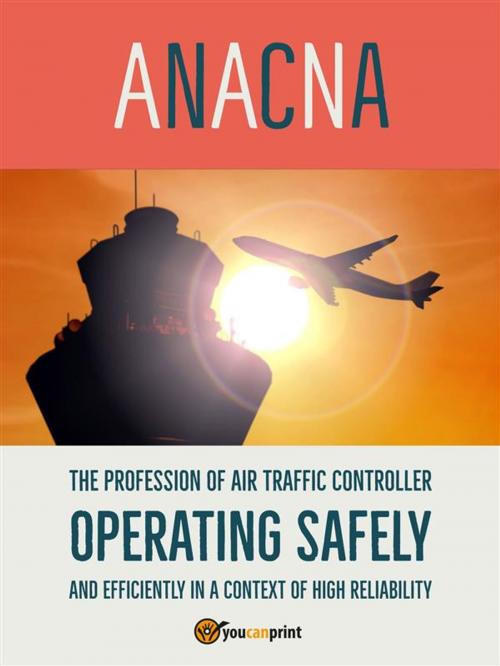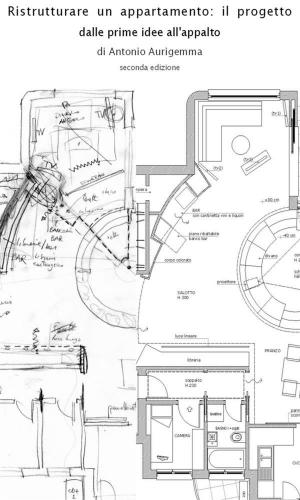The profession of air traffic controller operating safely and efficiently in a context of high reliability
Nonfiction, Social & Cultural Studies, Social Science, Sociology| Author: | Anacna | ISBN: | 9788827820704 |
| Publisher: | Youcanprint | Publication: | March 19, 2018 |
| Imprint: | Language: | English |
| Author: | Anacna |
| ISBN: | 9788827820704 |
| Publisher: | Youcanprint |
| Publication: | March 19, 2018 |
| Imprint: | |
| Language: | English |
The aim of the research was to analyse the practical and daily dimension of the work of the air traffic control officer (ATCO). The ATCO is an operator able to handle unexpected situations within a complex operating, technological and regulatory system while maintaining a high level of reliability and safety.
In particular, the work of the ATCO is characterized by two crucial elements: (1) the accurate management of time variables (air traffic management requires the air traffic controller to take decisions and act in extremely restricted fractions of time) and (2) continuous coordination with various items of technology and with other workers (pilots, other ATCOs and other types of personnel employed at airports). This means that it is an activity that at the same time presupposes both individual skills and capabilities and also collective capabilities, aimed at building a common space of mutual understanding and agreement with regard to the interpretive schemes to be utilised in order to deal with the multiple scenarios that can arise in the field of air traffic management.
The aims of the research were descriptive-analytical in nature:
Describe the characteristics of the ATCO profession, highlighting the aspects of reliability, safety and management of unexpected events;
Describe and analyse the cognitive and organizational complexity of the ATCO's work.
The research also involved goals of a practical-improvement kind, encouraging greater awareness in terms of:
the operators, with reference to the management of unexpected events, to the cognitive and organizational complexity of air traffic control activity, to the operational specificities associated with maintaining and increasing effectiveness, efficiency, reliability and safety in the management of air traffic;
The identification of improvement criteria for the initial selection and training (both at the start and then ongoing) of staff dedicated to air traffic control;
The complexity of the work of ATCOs in areas different from those of an academic-professional kind, in order to promote an informed exchange of expertise outside the world of the operators in the sector.
The research was promoted by four bodies: the Società Nazionale Assistenza al Volo (ENAV S.p.a.); the Associazione Nazionale Assistenti e Controllori Navigazione Aerea (ANACNA); the Confederazione Italiana Sindacati dei Lavoratori (FIT-CISL) and the Unione Italiana Controllo e Assistenza al Volo (UNICA). The research was carried out by a team from the Dipartimento di Sociologia e Ricerca Sociale dell’Università of Milano-Bicocca, composed of Maurizio Catino (director of the research project), Alessia Bianco Dolino, Diego Coletto and Chiara Locatelli.
The work presents some extremely innovative features in the field of studies available today regarding the profession of air traffic controller and constitutes the first research experience in this sector at an Italian level, as well as being one of first at an international level. In particular, these distinctive features involve, on the one hand, the research methodology used and, on the other hand, the theoretical frame of reference chosen for the analysis.
As far as research methodology is concerned, the techniques of organizational ethnography have been employed. This involved a long period of observation in the field of work itself (448 hours of observation over the course of a year), making it possible to directly observe the work practices adopted by front-line operators, the main characteristics of the work and the specific operational needs of the profession. Specifically, observations were carried out in four operating locations: the Area Control Centres (ACCs) in Rome and Milan and the Control Towers (TWRs) at Malpensa and Fiumicino airports.
The aim of the research was to analyse the practical and daily dimension of the work of the air traffic control officer (ATCO). The ATCO is an operator able to handle unexpected situations within a complex operating, technological and regulatory system while maintaining a high level of reliability and safety.
In particular, the work of the ATCO is characterized by two crucial elements: (1) the accurate management of time variables (air traffic management requires the air traffic controller to take decisions and act in extremely restricted fractions of time) and (2) continuous coordination with various items of technology and with other workers (pilots, other ATCOs and other types of personnel employed at airports). This means that it is an activity that at the same time presupposes both individual skills and capabilities and also collective capabilities, aimed at building a common space of mutual understanding and agreement with regard to the interpretive schemes to be utilised in order to deal with the multiple scenarios that can arise in the field of air traffic management.
The aims of the research were descriptive-analytical in nature:
Describe the characteristics of the ATCO profession, highlighting the aspects of reliability, safety and management of unexpected events;
Describe and analyse the cognitive and organizational complexity of the ATCO's work.
The research also involved goals of a practical-improvement kind, encouraging greater awareness in terms of:
the operators, with reference to the management of unexpected events, to the cognitive and organizational complexity of air traffic control activity, to the operational specificities associated with maintaining and increasing effectiveness, efficiency, reliability and safety in the management of air traffic;
The identification of improvement criteria for the initial selection and training (both at the start and then ongoing) of staff dedicated to air traffic control;
The complexity of the work of ATCOs in areas different from those of an academic-professional kind, in order to promote an informed exchange of expertise outside the world of the operators in the sector.
The research was promoted by four bodies: the Società Nazionale Assistenza al Volo (ENAV S.p.a.); the Associazione Nazionale Assistenti e Controllori Navigazione Aerea (ANACNA); the Confederazione Italiana Sindacati dei Lavoratori (FIT-CISL) and the Unione Italiana Controllo e Assistenza al Volo (UNICA). The research was carried out by a team from the Dipartimento di Sociologia e Ricerca Sociale dell’Università of Milano-Bicocca, composed of Maurizio Catino (director of the research project), Alessia Bianco Dolino, Diego Coletto and Chiara Locatelli.
The work presents some extremely innovative features in the field of studies available today regarding the profession of air traffic controller and constitutes the first research experience in this sector at an Italian level, as well as being one of first at an international level. In particular, these distinctive features involve, on the one hand, the research methodology used and, on the other hand, the theoretical frame of reference chosen for the analysis.
As far as research methodology is concerned, the techniques of organizational ethnography have been employed. This involved a long period of observation in the field of work itself (448 hours of observation over the course of a year), making it possible to directly observe the work practices adopted by front-line operators, the main characteristics of the work and the specific operational needs of the profession. Specifically, observations were carried out in four operating locations: the Area Control Centres (ACCs) in Rome and Milan and the Control Towers (TWRs) at Malpensa and Fiumicino airports.















